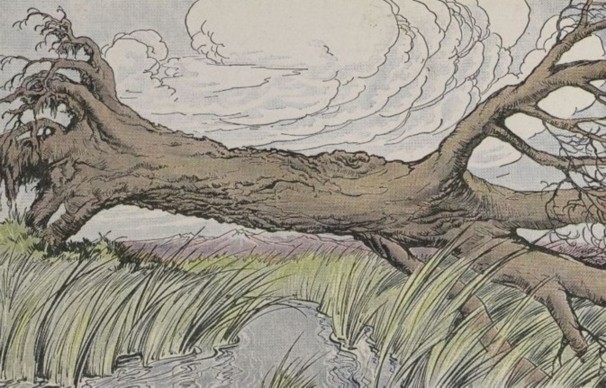| 1. slender | /SLEN-der/ |
| -having a circumference that is small in proportion to the height or length: | |
| Talent scouts have always favored slender young women. | |
| 2. upright | /uhp-RAHYT/ |
| -erect or vertical, as in position or posture. | |
| He sat upright after hearing some footsteps from the kitchen. | |
| 3. slight | /slahyt/ |
| -small in amount, degree, etc.: | |
| A slight decline in sales was observed in their latest report. | |
| 4. surface | /SUR-fis/ |
| -the outer face, outside, or exterior boundary of a thing | |
| Some scratches were seen on the surface of his desk. | |
| 5. resist | /ri-ZIST/ |
| -to withstand, strive against, or oppose: | |
| She could not resist the urge to eat pasta for breakfast. |

“You have reason to complain,” said the Oak. “The slightest breeze that ruffles the surface of the water makes you bow your heads, while I, the mighty Oak, stand upright and firm before the howling tempest.”
“Do not worry about us,” replied the Reeds. “The winds do not harm us. We bow before them and so we do not break. You, in all your pride and strength, have so far resisted their blows. But the end is coming.”
As the Reeds spoke a great hurricane rushed out of the north. The Oak stood proudly and fought against the storm, while the yielding Reeds bowed low. The wind redoubled in fury, and all at once the great tree fell, torn up by the roots, and lay among the pitying Reeds.
Better to yield when it is folly to resist, than to resist stubbornly and be destroyed.
| 1. | What would the Giant Oak do when the wind blew? |
| 2. | What would the Reeds do when the wind blew? |
| 3. | What happened to the trees when a great hurricane came? |
| 1. | How would you describe the Giant Oak? |
| 2. | How would you describe the Reeds? |
| 3. | If you were a tree, how would you respond to the hurricane? |
| 4. | The fable’s lesson is “Better to yield when it is folly to resist, than to resist stubbornly and be destroyed.” Do you agree with this? Why or why not? |
| 5. | In your opinion, when is it acceptable to give up on a dream? |
| Grammar 文法 |
Pronunciation 発音 | Vocabulary 単語 |
Comprehension 理解 |
|
|---|---|---|---|---|
 GOOD GOOD |
文法の誤りはほとんどなく、完全な文章で話すことができる | ほとんどの単語をはっきりと正しく発音することができる | 習った表現を適切に使うことができる | 文章を理解し、質問に正しく答えることができる |
 FAIR |
文法の誤りはあるが、完全な文章で話すことができる | 発音の練習が必要な言葉がいくつかある | たまにミスはあるが、習った表現を適切に使うことができる | 文章を完全に理解するのは難しく、質問に正しく答えられないときもある |
 POOR |
文章で話すのは難しく、単語だけで話すことができる | 発音の練習が必要である | 習った単語と表現を少しだけ使うことができる | 文章を理解するのは難しく、質問に答えるのは難しい |
An eBook from The Project Gutenberg.
This eBook is for the use of anyone anywhere at no cost and with almost no restrictions whatsoever. You may copy it, give it away or re-use it under the terms of the Project Gutenberg License included with this eBook or online at www.gutenberg.org